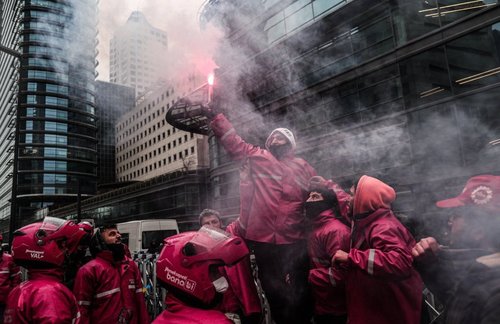According to the report jointly prepared by the Labor Studies Community (EÇT) and daily Evrensel, Turkey saw 108 strikes in January and February 2022. At least 17 thousand workers joined the strikes.
The report has shown that while at least 49 of these strikes ended in favor of workers, eight strikes are still ongoing. The report has noted that the gains of workers were verbally expressed in 8 strikes.
During the process, only the strike at the BBC İstanbul office was legal while 107 strikes were de facto. 104 strikes took place in the private sector while public workers/ officials went on strike in 4 places.
105 strike actions were participated by blue collar workers while three strikes (BBC and public health workers) were done by white collar workers. 96 percent of strikes were against law wage increases.
The average duration of strikes was 3.1 days.
None of the strikes were done without the involvement of a union. In 26 strikes were independent unions involved as organizers or contributors while the unions affiliated with the Confederation of Progressive Trade Unions of Turkey (DİSK) were involved in 12 strikes and the unions affiliated with the Confederation of Turkish Trade Unions (Türk-İş) were involved in 18.
The highest number of strikes were seen in İstanbul with 33 strike actions. İstanbul was followed by Antep (32 strikes), İzmir (25), Kocaeli and Mersin (4 strikes each), Tekirdağ and Eskişehir (2 strikes each) and Artvin, Denizli, Erzincan, Sivas, Şırnak and Burdur (1 strike each).
45 strikes were in the sector of ship building/ warehouse, 10 were in transportation, 8 in petrochemistry, 7 in metal, 4 in construction and 2 strikes were in the food, mining, public health and general affairs sectors. One strike each was the case in the sectors of energy and the press.
‘We have no life other than earning and paying debt’
The report has also cited news reports and articles published by daily Evrensel. Speaking to the daily, some workers have said:
A worker of a sock factory: “I worked overtime for 150 hours in January. For a week, I came at 4 pm and left the factory at 8 in the morning. Don’t I know how to work for 8 hours and then lie down at my house? The wage they give me is not enough; that is why I did overtime.”
A worker of Yemeksepeti online food delivery company: “I haven’t gone to the cinema, seen a theater play or attended a concert for two years. I haven’t got a girlfriend for a long time, I have forgotten how to talk to a woman. We have no life other than earning money and paying debts. Our married friends cannot see their spouse and children.”
A textile worker: “Workers’ aim is that they don’t run out of money, they save money and offer their children a future. If we send our child to the preparatory course, we will have to give our 6-month wage.”
A metal worker: “Everyone is striving to work overtime, to work during bank holidays. Workers tell managers, ‘I can do overtime, I don’t go to my hometown during the feast, I am here.’ Workers who would not work overtime in the past now look forward to overtime work after this new gain as they have credit card debt, pay rent and their children go to school.”
A worker of Migros supermarket chain: “We are the ones who are oppressed after all. The rich side has the potential to do everything. To protect that man, to protect one person, they dismissed 250-300 people before our eyes. To me, this picture is a source of shame for Turkey. Everyone who deems workers worthy of this should be ashamed.” (HA/SD)
Source:Bianet
***Show us some LOVE by sharing it!***



